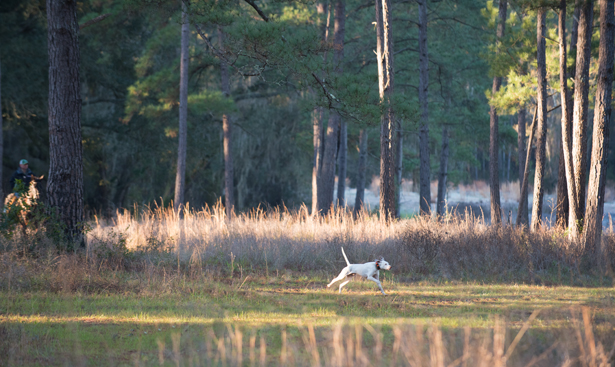Ben Reach lamented the disappearance of black scouts from pointing dog field trials. They were gone for economic reasons, not because of discrimination. Handlers simply could not afford employee-scouts, electing instead out of necessity to trade scouting duties with fellow handlers. It saved payroll and horse expense, but it had cost much of the heart of the game.
Now instead of employee-scouts, handlers scouted for one another. It saved payroll and horse expense, but it cost too. Handlers were seldom skilled scouts, did not really know the dogs they scouted like a hired scout would, and of course hauled a huge conflict-of-interest, for as scouts they were supposedly working in aid of their own dogs’ defeat.
Ben was trying to explain this to Sam, as they sat at Ben’s conference table on a Friday afternoon, easing their aches with drams of The Macallan. Joanne had hugged them each goodby and slipped off to have her hair fixed for a Saturday night dancing date.
“Hell, Ben, if the handlers know they must do the best they can to help one another or never have a good scouting partnership, that should keep them in line,” Sam said.
“Sam Nixon, you have always been an unrealistic optimist on human nature. When a man is asked to defeat himself he will seldom do it, especially if he can create an excuse that hides his duplicity.”
“What the hell does that mean?” Sam asked.
“Let me tell you a true story. One season two top handlers, each about forty, both sons of top handlers, were partnered up scouting for one another. They each had a good derby that year, each one in contention for Derby of the Year. They were running in the Continental Derby Championship.
“ One’s derby was down, doing a good job with two finds, when it disappeared. The handler figured his partner had the derby, heeling it to where he could shoot it to the front for a good show. But more and more minutes passed, and then the derby was gone too long.
“Something told the handler to ride backwards. He quickly came upon his partner with the derby in harness, following the gallery. He had intentionally caused its defeat, in hopes of assuring his own derby the Derby of the Year award. That ended that scouting partnership,” Ben said.
“What’s the best you ever saw a scout do to help his handler and a dog he was scouting?” Sam asked.
Before replying, Ben poured the curmudgeons a dividend.
“It was in an all-age stake back before the buddy system. The handler had run a dog he thought was in first place. He was pleased, because a win would qualify the dog for the National. In the last brace, the handler’s entry started doing a great job, and he became afraid it would beat his dog he hoped was in the lead. He called in his black scout and said, ‘Get this dog lost.’
“The scout nodded understanding, then heeled the dog and rode out of sight but not so far back he was not aware how things were unfolding. He saw the other dog in the brace begin to find birds and run a great race. He saw defeat developing for his team’s entry that had run earlier.
“When the dog he’d been ordered to “lose” had been unseen fifteen minutes he brought it forward unseen and then shot it from a key spot so in it’s time remaining it showed great for the judges. It made some magnificent casts and scored on birds twice, the second just after time but it counted. It won first place, and the brace mate got second. The dog the handler wanted to win didn’t place. If the scout hadn’t overruled his handler’s order the team would have been out of the money. That’s the best job of scouting I ever saw,” Ben said as he sipped his last drop of The Macallan.
